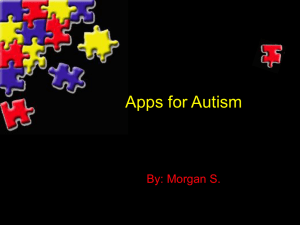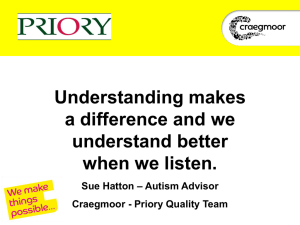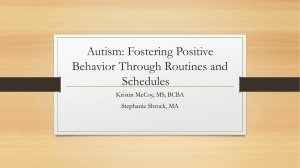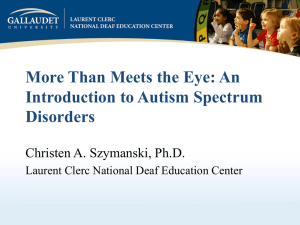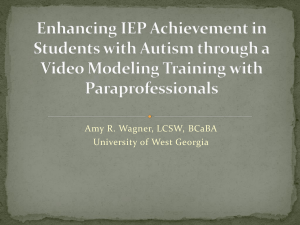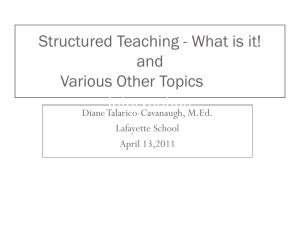Autism-What to do the first year - Autism Society of Greater Phoenix
advertisement
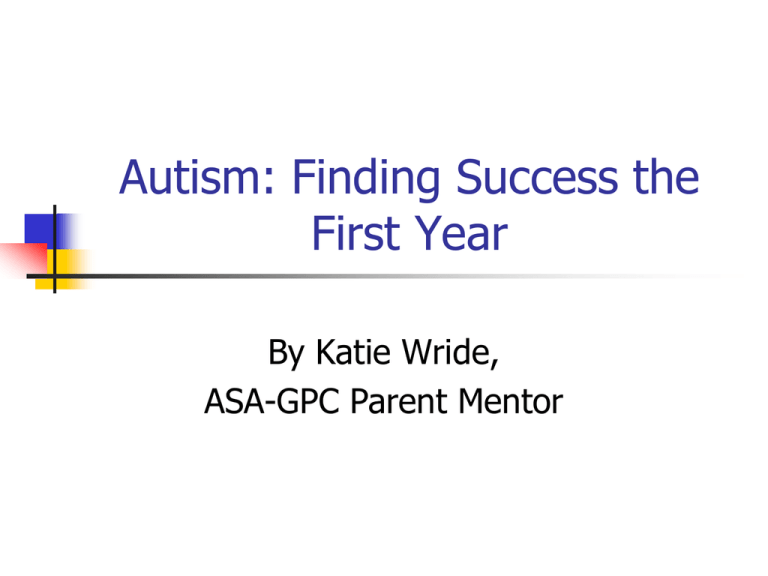
Autism: Finding Success the First Year By Katie Wride, ASA-GPC Parent Mentor What do I do first? 1 - Join a support group in your area -Online, in-person, Parent Mentors 2 - Get a diagnosis 3 - Contact DDD/ALTCS 4 – Contact your school district 5 – Learn: - By reading books and websites off of suggested reading lists - By attending local or natl. conferences 6 – Find local Doctors (See co-morbid conditions) 7 – Begin therapies (Agency and Parent-led) 8 – Find time for yourself 1- Join a Support Group EAST VALLEY MEETING: We are partnering with EVAN (East Valley Autism Network) and ABC(Autism Biomedical Connections) for this meeting each month TIME: 7-9pm WHEN: 4th Tuesday of each month WHERE: Mi Amigo’s Mexican Restaurant-1264 S Gilbert Rd, Mesa, 85204 NORTH VALLEY MEETING: TIME: 6:30 to 8:00pm WHEN: 3rd Wednesday of the month WHERE: Paradise Valley Community Center-17402 North 40th St. Phoenix, 85032 WEST VALLEY MEETING We are partnering with Shelly Vincant’s West side group for this meeting. TIME: 7-9 PM WHEN: 2nd Monday of each month WHERE: New Life Community Church-8155 W. Thunderbird Rd., Peoria, 85381 Mom’s Meet Up WHEN: Friday from 9:30 to 11:00 AM WEST VALLEY: Wildflower Bread Company at Arrowhead Gateway17530 N. 75th Avenue Glendale, 85308 NORTH VALLEY: Paradise Bakery at Desert Ridge, 21001 N. Tatum Blvd., Suite 48-1520 Phoenix, 85050 EAST VALLEY: Barnes and Noble at San Tan Village, 2150 East Williams Field Rd #105 Gilbert, 85295 2 - Get a Diagnosis You will need an Autism diagnosis (or an at risk for Autism before age 6) from a licensed psychologist or developmental pediatrician. (See Doctors who diagnose handout). 2 – Get a diagnosis – Some Doctors that diagnosis Joseph A. Gentry, Ph.D., BCBA 602.312.2911 www.gentrypbs.com Chris Nicholls, PhD, ABPdN Telephone number is 480-998-2303 Hoard, Cynthia E. EdD 602-616-9682 Michael LeVoie at Phoenix Children's Hospital Sharon McDonough-Means Developmental & Educational Psychological Services (480) 659-5563 Contact: Carol McLean, Ph.D. Clinical Child Psychologist Logerqist, Sally J. PhD 602-277-2273 Natasha Hill www.hillchildcouseling.com Dr. Alan Wexler Val Vista and the US 60 Dr. Astrid Heathcote 480-275-2249 in Awahtukee Christina K. Lebovitz, Ph.D (480) 368-9898 E-mail: cklebovitz@hotmail.com Programs in Developmental and Behavioral Pediatric Center Developmental Evaluation Clinics, St. Joseph's Children's Health Center Tel: (602) 406-3543 Contact: Dr. Daniel Kessler, Dr. Karlsson Roth, Ph.D., Ltd. Tel: (602) 863-0101 Dr. Jan Blackham, PhD Phoenix Children’s Hospital 602-546-0990 Lanie Y. Zigler. Ph.D., Neuropsychology Specialists (602) 996-1396; (602) Email: lzigler@azcns.com Web : www.azcns.com Melmed Center Tel: (480) 443-0050 Web site: www.melmedcenter.com 3 – Contact DDD/ALTCS 1. First - Contact DDD at: Arizona Department of Developmental Disabilities 602.542.0419 www.azdes.gov/ddd/ - Visit the Navigating the system guide at: https://www.azdes.gov/ddd/downloads/navigating%20we b%20version.pdf Arizona Early Intervention Program for children 0-3 years old www.azdes.gov/azeip/azeipinfo.asp 3 – Contact DDD/ALTCS In order to be eligible for DDD you must: 1- Be a resident of Arizona 2- Be at risk of having a developmental disability (before the age of 6); after the age of 6 you must have a diagnosis of : epilepsy, cerebral palsy, Autism, or cognitive disability 3- Must be diagnosed before the age of 18 4- Must have functional limitation in 3 of 7 major life areas: Self-care, receptive/expressive language, learning, mobility, independent living, self-direction ARIZONA DEPARTMENT OF ECONOMIC SECURITY Division of Developmental Disabilities District Offices DISTRICT VII ADMINISTRATIVE OFFICES Central Administrative Office 1789 W. Jefferson St. Phoenix, AZ 85007 602.542.0419; 866.229.5553 Health Care Services - 2200 N. Central Ave., 207 Phx, AZ 85004 602.238.9028; 800.624.4964 DISTRICT VIII (ATPC) 2800 N. Hwy. 87 Coolidge, AZ 85229-1467 520.723.4151 TOLL FREE NUMBERS Central Office: 1.866.229.5553 District I: 1.800.749.9490 District II: 1.877.739.3943 District III: Flagstaff: 1.888.289.7177 Chinle: 1.866.560.8325 Show Low: 1.888.537.8013 Window Rock: 1.800.770.6493 Prescott: 1.888.289.2003 Tuba City: 1.866.283.4520 District IV: 1.877.739.3922 District V: Globe: 1.877.227.1100 Apache Junction: 1.877.739.3926 ATPC: 1.877.739.3941 District VI: 1.877.739.3938 x5625 DISTRICT I (MARICOPA COUNTY) District Administrative Office* 4000 N. Central St., Ste. 900 Phoenix, AZ 85012 602.246.0546 *Intake 3 years old and over Camelback Office - 2001 W. Camelback Rd. Ste. 170 Phoenix, AZ 85012 602.870.1721 Dobson Office - 163 N. Dobson Rd. Mesa, AZ 85201 480.890.7301 McKinley Office - 1824 E. McKinley St. Phoenix, AZ 85006 602.258.2375 Indian School Office (Intake 0-3 years - 1430 E. Indian School Rd., Ste. 205 Phx, AZ 85014 602.277.8724 Mesa Office - 1619 E. Main St. Mesa, AZ 85203 480.834.4233 Metro Office - 11225 N. 28th Dr. C-207 Phoenix, AZ 85029 602.375.1403 North Office - 14040 N. Cave Creek Road Phoenix, AZ 85022 602.485.0236 South Office - 2602 S. 24th St., Ste. 108 Phoenix, AZ 85034 602.231.9218 Southwest Office - 3802 N. 53rd Ave., #250 Phoenix, AZ 85031 623.845.9804 Tempe Office - 5038 South Price Road #114 Tempe, AZ 85282 480.831.0153 Gilbert Office - 2288 W. Guadalupe Rd. Gilbert, AZ 85323 480.831.1009 Avondale Office - 290 E. La Canada Blvd. Avondale, AZ 85323 623.925.5270 Surprise Office - 11526 W. Bell Rd. Surprise, AZ 85374 602.771.1700 3 – Contact DDD/ALTCS 2. Second - contact Arizona Long Term Care to qualify for federal funding for services:(ALTCS) 602-417-6600 –Phx office; 602-417-6400- Mesa office http://www.ahcccs.state.az.us/Services/Programs/ALTCS.asp -You will first have a financial interview over the phone to make sure that your child does not have more than $2000 in his/her name to qualify. -Next you will have an interview to determine if your child is at risk for institutionalization. The interviewer will ask you questions from the PAS tool and you will need 40 points to qualify for services. -Contact an ASA-GPC Parent Mentor to help you through this process. -Arizona’s Health Care Cost Containment System AHCCS (state medical insurance) http://www.ahcccs.state.az.us/site/ 4 - Contact your school district In order to get appropriate services for your child in school, contact your local school district and ask in writing for a complete Educational evaluation to be completed on your child. They will have 60 days to evaluate your child. To find your school district look up Arizona Department of Education at: www.ade.az.gov or call 602-542-5393 Once your child is evaluated for Special Ed services you will have an IEP meeting to determine goals and what placement is appropriate for your child’s needs. For more information on IEP’s and Special Education Law visit: www.wrigtslaw.com 4 – Contact your school district Here is a list of the PINS (Parent Information Network Specialists) in our area: Gila, Pinal Amy Dill (480) 759-1029 Maricopa - West (623 Area Code) Jill Castle (480) 699-0067 Maricopa - East (480 Area Code) Barbra Ross (480) 607-3030 Maricopa - Central (602 Area Code) Holly Reycraft (480) 726-7205 PINS are consultants who provide on-site and phone consultation, training, resources, and information and referrals to support parents of special education students. 5 - Learn Where to go for help or for more information Arizona Center for Disability Law: Advocates for the legal rights of persons with disabilities * to be free from abuse, neglect and discrimination * to have access to education, health care, housing and jobs, and other services in order to maximize independence and achieve equality Visit: www.acdl.com Phoenix: (602) 274-6287 Arizona's Advocates: Assisting families in reaching the high expectations for your child and supporting successful navigation of the educational system to get the appropriate services and placement. These are experienced advocates here to help you gather information, understand the rules of the special education process, and to support you to plan and prepare for meetings. We bring knowledge, experience, and expertise to your child's educational meetings. www.ArizonaSpecEdAdvocates.com (602) 471-0346 Autism Society of America- Great Phoenix Chapter’s Parent Mentors Call Cynthia Macluskie: (480) 940-1093 or cynthia@phxautism.org Call Susan Sunseri: (602) 312-4997 or susan@phxautism.org Katie Wride: (602) 295-8062 or katie@phxautism.org Raising Special Kids : a non-profit organization of families helping families of children with disabilities and special health needs in Arizona. All programs and services are provided to families free of charge. At all ages and stages of a child's development, Raising Special Kids supports parents through Parent-to-Parent programs, Special Education information, individual IEP consultation, training, and problem-solving support. Contact them at (602) 242-4366 or www.raisingspecialkids.org Arizona Governor's Council on Developmental Disabilities Works to build bridges, increase understanding and create opportunities to banish misconceptions and change public policy: www.azgcdd.org Autism Book List These are some recommended book resources for families affected by autism. General Information Beyond the Wall – Stephen Shore Thinking in Pictures – Temple Grandin Ten Things Your Child with Autism Wishes you Knew- Ellen Notbohm Autism Spectrum Disorders from A to Z – Barbara Doyle Top Ten Tips: A Survival Guide for Families with Children on the Autism Spectrum -Teresa A. Cardon Education Visual Strategies for Improving Communication – Linda Hodgdon The Child With Special Needs: Encouraging Intellectual and Emotional Growth - Stanley Greenspan Autism Book List These are some recommended book resources for families affected by autism. Early Intervention / Applied Behavorial Analysis (ABA) Right From the Start - Behavioral Intervention for Young Children with Autism Sandra Harris & Mary Jane Weiss - 1998 Let Me Hear Your Voice - A Family’s Triumph over Autism-- Catherine Maurice Teaching Developmentally Disabled Children - The Me Book - O.Ivar Lovaas Behavioral Intervention for Young Children with Autism, Maurice, Green & Unraveling the Mystery of Autism and Pervasive Developmental Disorders, Biological Treatments for Autism & PDD, William Shaw, MD, 2003, 2nd Edition Luce Biomedical Treatments Karyn Seroussi, 2000 IEP / School Districts & Legal Issues The Complete IEP Guide: How to Advocate for Your Special Education Child Lawrence Siegel, 2007 ed You’re Going to Love this Kid: Teaching Students with Autism in the Inclusive Classroom-- Paula Kluth Wrightslaw: From Emotions to Advocacy, 2nd Edition --Pam Wright & Pete Wright 5 - Learn – From Websites www.phxautism.org/resources.html www.gfcfdiet.com www.pecanbread.com (SCD) www.autismndi.com www.livingwithout.com www.autism.com www.autismwebsite.com/ari www.danconference.com www.kirkmanlabs.com www.autismone.org www.lovaas.com www.otideas.com www.apraxia-kids.com 6 – Find Local Doctors Learn the co-morbid conditions and the specialists in the valley that will rule these out (See co-morbid presentation) Seizure Disorders Gastrointestinal Disorders Immune Deficiency and Dysfunction Hypothyroidism Mitochondrial Disorder or Dysfunction 7 – Begin Therapies Even before you are approved for therapies through the state, check your insurance company to see if they cover OT, Speech, and Physical therapy for your child. Contact the ASA-GPC Parent Mentors or the Autism Resource Guide From ASA-GPC coming at the end of the summer for a recommended list of agencies that provide these therapies. Once approved through the state, often you will receive OT, Speech, Physcial, & Music therapies as well as Habilitation and Respite. 7 – Begin Therapies Therapies for Autism Educational/behavioral therapies are often effective in children with autism, with Applied Behavioral Analysis (ABA) usually being the most effective. These methods can and should be used together with biomedical interventions, as together they offer the best chance for improvement. Parents, siblings, and friends may play an important role in assisting the development of children with autism. Typical preschool children learn primarily by play, and the importance of play in teaching language and social skills cannot be overemphasized. Ideally, many of the techniques used in ABA, sensory integration, and other therapies can be extended throughout the day by family and friends. 7 – Begin Therapies Applied Behavior Analysis: Many different behavioral interventions have been developed for children with autism, and they mostly fall under the category of Applied Behavioral Analysis (ABA). This approach generally involves therapists who work intensely, one-onone with a child for 20 to 40 hours/week. Children are taught skills in a simple step-by-step manner, such as teaching colors one at a time. The sessions usually begin with formal, structured drills, such as learning to point to a color when its name is given; and then, after some time, there is a shift towards generalizing skills to other situations and environments. A study published by Dr. Ivar Lovaas at UCLA in 1987 involved two years of intensive, 40-hour/week behavioral intervention by trained graduate students working with 19 young autistic children ranging from 35 to 41 months of age. Almost half of the children improved so much that they were indistinguishable from typical children, and these children went on to lead fairly normal lives. Of the other half, most had significant improvements, but a few did not improve much. ABA programs are most effective when started early, (before age 5 years), but they can also be helpful to older children. They are especially effective in teaching non-verbal children how to talk. Parents are encouraged to obtain training in ABA, so that they provide it themselves and possibly hire other people to assist. Qualified behavior consultants are often available, and there are often workshops on how to provide ABA therapy. 7 – Begin Therapies Speech Therapy: This may be beneficial to many autistic children, but often only 1-2 hours/week is available, so it probably has only modest benefit unless integrated with other home and school programs. Sign language and PECS may also be very helpful in developing speech. Occupational Therapy: This can be beneficial for the sensory needs of these children, who often have hypo and/or hyper sensitivities to sound, sight, smell, touch, and taste. Many autistic individuals have sensory problems, which can range from mild to severe. These problems involve either hypersensitivity or hyposensitivity to stimulation. Sensory integration focuses primarily on three senses — vestibular (i.e., motion, balance), tactile (i.e., touch), and proprioception (e.g., joints, ligaments). Many techniques are used to stimulate these senses in order to normalize them. Physical Therapy: Often children with autism have limited gross and fine motor skills, so physical therapy can be helpful. 7 – Begin Therapies Auditory Interventions: There are several types of auditory interventions. The only one with significant scientific backing is Berard Auditory Integration Training (called Berard AIT or AIT) which involves listening to processed music for a total of 10 hours (two half-hour sessions per day, over a period of 10 to 12 days). There are many studies supporting its effectiveness. Research has shown that AIT improves auditory processing, decreases or eliminates sound sensitivity, and reduces behavioral problems in some autistic children. Other auditory interventions include the Tomatis approach, the Listening Program, and the SAMONAS method. There is limited amount of empirical evidence to support their efficacy. Information about these programs can be obtained from the Society for Auditory Intervention Techniques’ website www.sait.org. Relationship Development Intervention (RDI): This is a new method for teaching children how to develop relationships, first with their parents and later with their peers. It directly addresses a core issue in autism, namely the development of social skills and friendships. Website: www.rdiconnect.com A few agencies in the valley that provide therapy: Affinity Family Care - www.affinityfamilycare.com Arion Care Solutions - www.arioncaresolutions.com Arizona Autism United (AZA United): www.azaunited.org Baio Enterprises – www.baioenterprises.com Boulder Mt Therapy - www.bouldermountaintherapy.com Center for Autism and Related Disorders, Inc. (CARD) www.centerforautism.com Coester Cares Therapy Services, LLC www.coestertherapyservices.com Guthrie Mainstream - www.guthriemainstream.org HOPE Group - www.hopegroup.org Lauren's Institute for Education (L.I.F.E.) www.laurensinstitute.org/ Pediatric Language & Speech Specialistswww.pediatricspeech.net/ PlayABA - www.play-aba.com S.E.E.K. Arizona - www.SEEKArizona.org 8 – Make Time for Yourself Be sure to use respite (babysitters) to get out and do the things you loved before you entered on the Autism journey. Remember that marriage support is key-(Over 85% of marriages of parents of children with Autism end in divorce.) Remember your other children – they need your love and attention too. Be sure to have a hobby of your own, exercise, and even read for pleasure! Even though there is a lot to handle with a child with Autism, you have to remember that this is a marathon and not a sprint. HOPE- Never Give Up! You must never forget that there is hope, even when others may say there is not. With treatments like biomedical interventions, ABA, RDI, AIT, etc. children with Autism are getting better and recovering skills many never thought possible. YOU CAN DO IT!


